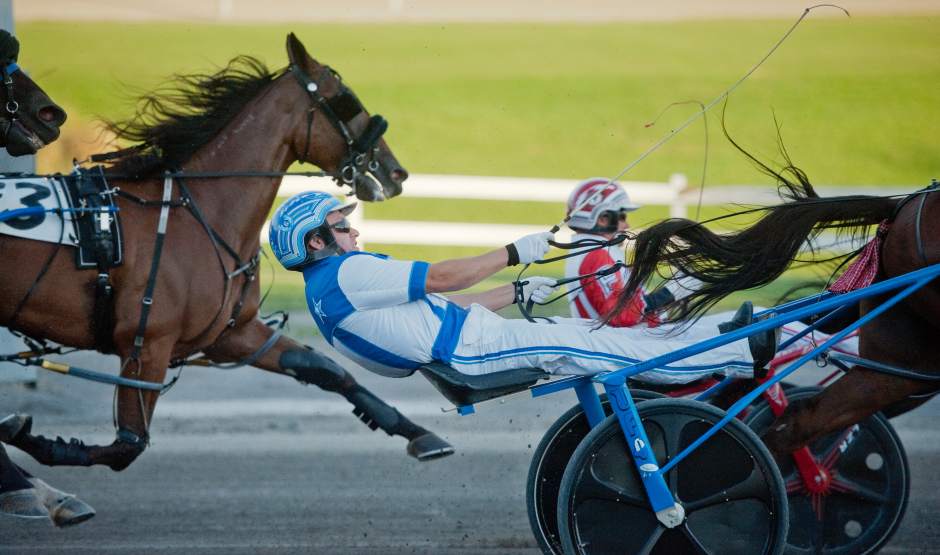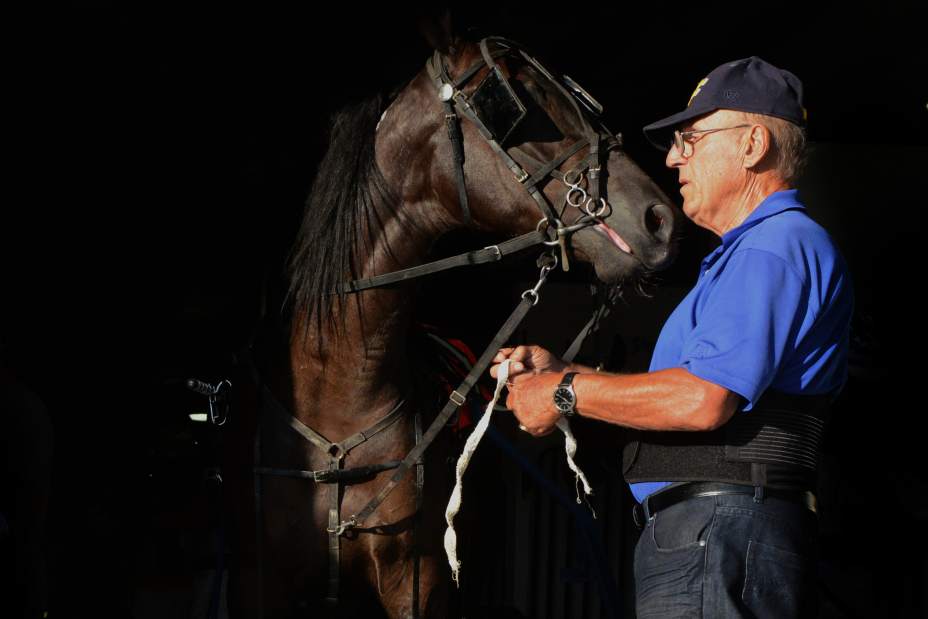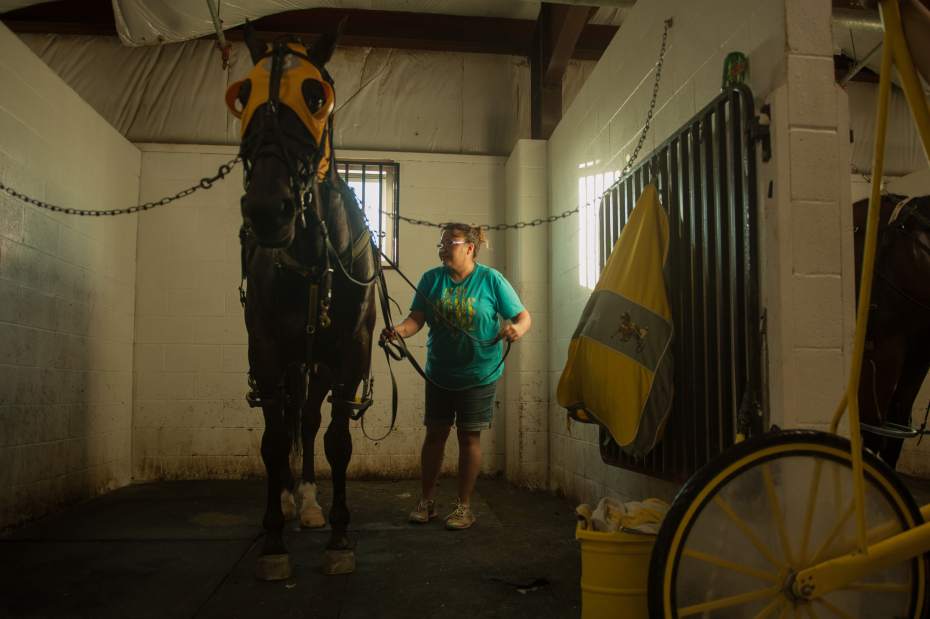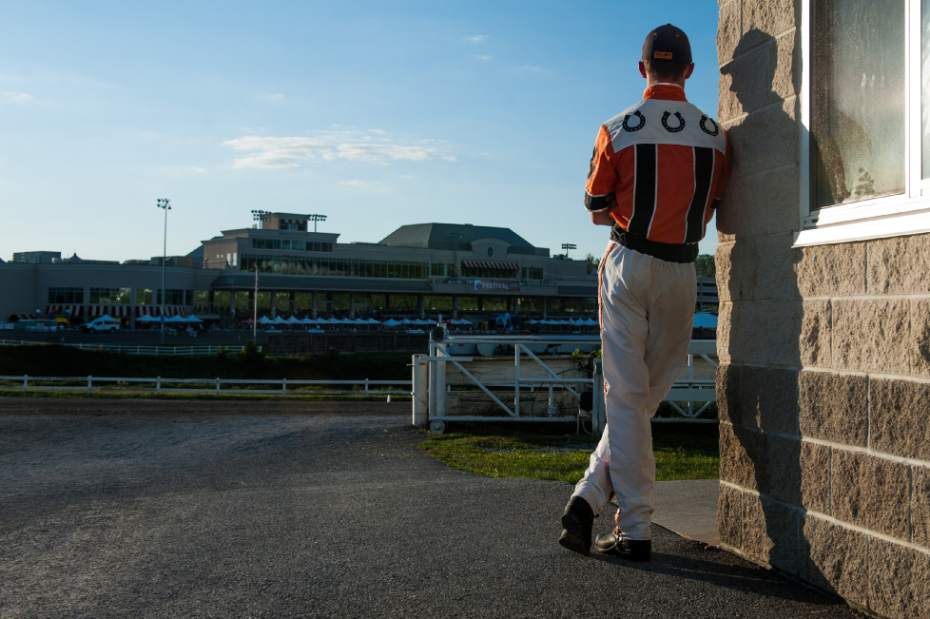Non-Pennsylvanians win bulk of taxpayer-subsidized racetrack purses
Out-of-state racehorse owners are collecting millions of dollars in purses funded by Pennsylvania tax revenue, a Tribune-Review investigation found.
A little more than 10 years since the Legislature legalized gambling — a move driven in part by horse racers trying to save what was then a dying industry — prizes for winning horse races in Pennsylvania have never been higher.
That has drawn horse owners and purse winners from around the world, including the prime minister of the United Arab Emirates, a Saudi prince and business people such as Melvin Hartman, president of a Canadian food company. Hartman owns standardbreds, the trotting horses that compete at Pennsylvania's three harness-racing tracks, including The Meadows Racetrack & Casino in North Strabane.
“We race in Pennsylvania because the purses are very good,” said Hartman, 71, of Ontario.
His horses have won nearly $2.8 million in Pennsylvania since 2013.
Most of the top harness-racing partnerships include at least one person or company from out of state. Together, those partnerships won about $50 million since 2013, and $31 million of the winnings went to partnerships with no one from Pennsylvania.
Likewise, 12 of the top 20 money-winning thoroughbred owners live outside the state. They've won almost $17 million, compared with $15 million won by eight Pennsylvania owners, the Trib found.
Most of those winnings are paid from state money. Last year, a state tax on slot machines at the 12 casinos, including Rivers Casino in Pittsburgh, funded $179 million in purses, making up 87 percent of the money available to winning racers, according to the Pennsylvania Gaming Control Board.
The state imposes a 55 percent tax on slots, 12 percent of which goes to the horse-racing industry.
“Whether the revenue comes from gambling or income taxes or sales taxes, it's still a handout from the government to an individual industry,” said state Rep. Todd Stephens, R-Montgomery County.
The state's slot machine tax generated about $242 million last year for the racehorse industry. About $36 million paid for the state's breeders funds — the PA Breeding Fund, the Sire Stakes Fund and the PA Standardbred Breeders Development Fund — which offer “breeder awards” or bonuses to winning horses bred in the state.
“I buy American-breds, Canadian-breds, and I basically race them in the state or province where they're eligible” for breeders awards, Hartman said.
Pennsylvania is among 20 states that divert some revenues from casinos and/or slots parlors to boost purses for winning horse races, the American Gaming Association said. Despite declines in betting on horse races, the Thoroughbred Racing Associations reports that state subsidies provided more than $400 million in 2014 toward a total $1.1 billion in prize money.
Legislators in some states are reconsidering what they believe is the equivalent of subsidizing gambling at a time when many states are struggling with budget problems.
Stephens last year proposed redirecting Pennsylvania's slots taxes to schools, rather than “out-of-state, millionaire racehorse owners,” as he wrote in a memo seeking support for his bill. Only 17 of 203 members of the Republican-controlled House signed on. The bill never made it to a committee hearing.
Many House Republicans who might otherwise agree with Stephens' free-market argument represent rural districts with farms and other businesses that depend on horse racing.
“Obviously, people are coming here. ... They're buying properties, they're boarding horses,” said state Sen. Elder Vogel Jr., R-New Sewickley.
Tax-money turnaround
The General Assembly legalized slot machines in 2004 after years of lobbying by a horse-racing industry beset by shrinking revenue. People were not betting on horses as much, and since those bets funded the purses, the potential return on horse owners' investments dwindled.
“We were ready to leave,” said Ron Burke, owner of Burke Racing Stable in Deemston, Washington County.
Burke's stable had never won more than $1 million in any year before revenues from the state's slots tax filled harness racing's purses. No Pennsylvania stable had ever won more than $10 million, he said. In the years before casinos, he considered moving to New York, which subsidized purses with gambling taxes.
But with the infusion of casino cash, Burke stayed and built the most successful harness-racing operation in North America. He won a record 6,000th race in May. Last year, his horses broke his own earnings record by winning $28 million — almost triple what the best Pennsylvania stables won before gambling.
“It basically saved horse racing in Pennsylvania,” Burke said. “We would not be here. ... Instead of leaving, we've expanded tremendously.”
Burke's operation grew from 20 employees to 50, and his stables now include 250 horses.
Stable workers “can make $30,000, $40,000 a year,” Burke said. “We provide health care, which we couldn't do before. It's changed their lives.”
The slots tax provided $11.1 million in health and pension benefits for horse trainers and other employees last year, according to the gaming board.
Burke races mostly at The Meadows, the only harness track in the state where most of the top horse-owning partnerships include at least one person from Pennsylvania. Most harness-racing horses are owned by partnerships, not individuals.
Fifty-two of the top 60 money-winning partnerships at The Meadows include someone from Pennsylvania.
At Harrah's Philadelphia Casino and Racetrack, half of the top partnerships included Pennsylvania owners. At Pocono Downs, out-of-state partnerships outnumber in-state groups 37 to 23.
Supporters of the industry say that's still a net gain for Pennsylvania. Large purses draw horse buyers from around the world, which drives up the prices local breeders can command, said Hartman, the standardbred owner from Ontario.
“If the horses are owned by somebody from New York, Maryland, those horses are still trained here (in Pennsylvania). They're still kept here. They hire people here. They're fed here,” said state Rep. Peter Daley, D-Coal Center.
But the number of racehorses bred in Pennsylvania has fallen in recent years. The 879 thoroughbreds foaled in Pennsylvania in 2013 were the fewest since 2002, and down from 1,540 foaled in 2009, according to the most recent figures available from The Jockey Club, a New York-based industry group.
Standardbred breeding has dropped as well — 1,477 yearlings reported in Pennsylvania last year, down from a high of 1,800 in 2011, according to the Gaming Control Board.
Purse money, however, continues to hover around $200 million a year.
In-state betting has fallen steadily as well: from $125 million in 2006 to $81 million last year. Adjusted for inflation, that's a 45 percent drop since slot machines began pumping up purses.
But the amount of money wagered and won by people outside the state surged from $456 million in 2006 to $684 million last year, a 28 percent increase, adjusted for inflation.
“The casino money is what's keeping horse racing in business,” said Robert Tresente, 73, a New Jersey thoroughbred owner whose horses have won about $2.3 million in Pennsylvania since 2013, according to Equibase Co., the horse-racing industry's repository for statistical information.
‘It's a special skill'
Tresente, a retired parking lot owner, said he owns 10 or 11 Pennsylvania-bred horses and keeps 15 to 19 in the state. Each horse costs him about $2,500 monthly in training, boarding, shoeing and veterinary bills, he said. In addition, each horse's trainer and jockey gets 10 percent of the winnings apiece.
That money pays their salaries and the salaries of the stable hands they employ.
“Some of them have been doing this for 40 years,” Tresente said. “They wouldn't have any other way to make a living. They're not going to work at McDonald's. It's a special skill.”
Horse owners — no matter where they live — generally are wealthy enough to live without purse subsidies, even if it means getting out of racing altogether, said Brian Gillespie, 42, of Upper St. Clair. He runs a construction company and got into racing about four years ago as a hobby.
“For the owners, yeah, I'd be upset, but I'd be more upset for the guy living paycheck-to-paycheck,” said Gillespie, whose late grandfather, Edward Ryan, owned The Meadows.
Gillespie said he would like to see more of the purse money go to Pennsylvania owners, but recognizes that's easier said than done.
“That would be like somebody in Virginia getting upset if I was allowed to come down and build houses,” Gillespie said. “It's tough to stop somebody from exercising free will and entering into a new market.”
That, Stephens said, is why the state should get out of subsidizing the horse-racing business. While the Republican-controlled Legislature and Democratic Gov. Tom Wolf remain locked in a months-long stalemate over new taxes, he said lawmakers should re-evaluate what they're doing with tax money coming in — and whether government should use some of that money for the benefit of one industry.
“Why not the pet rock industry? I've got a couple quarries in my district. If we put $250 million a year into pet rocks in Pennsylvania, we would employ all kinds of people at the quarries, we'd employ all kinds of truck drivers to haul the rocks, we would employ people to paint the rocks. It sounds absurd, but isn't that exactly what we're doing?” Stephens said.
He contrasted the state's treatment of horse racing with a proposed tax on natural gas drillers.
“I think it's incredibly hypocritical to increase taxes on one industry that can create a lot of jobs at the same time we're giving handouts to other industries for the same reason,” Stephens said.
But taking away horse-racing subsidies would be like taking away the industry's life support, owners said.
“If they think for one second that the industry can survive,” Burke said, pausing for a moment, “it'll be gone immediately.”
Mike Wereschagin is a staff writer for Trib Total Media. He can be reached at 412-320-7900 or mwereschagin@tribweb.com.





